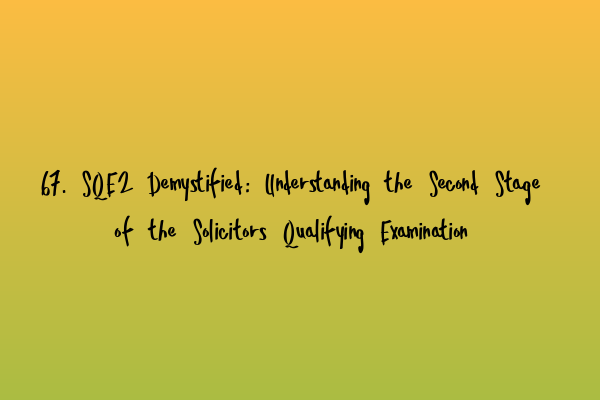SQE2 Demystified: Understanding the Second Stage of the Solicitors Qualifying Examination
Are you ready to take the next step in your legal career? The Solicitors Qualifying Examination (SQE) is the new assessment pathway for aspiring solicitors in England and Wales. It is divided into two stages – SQE1 and SQE2. In this blog post, we will demystify the second stage of the exam, SQE2, and provide you with all the essential information you need to succeed.
What is SQE2?
SQE2 is designed to test your practical legal skills and knowledge in various practice areas. It focuses on the application of law in different contexts and your ability to manage legal matters efficiently. This stage assesses your competence to practice as a solicitor and involves both written and oral assessments.
What are the key components of SQE2?
There are three key components of SQE2:
- Functioning Legal Knowledge (FLK) Assessments: In this assessment, you will be tested on your knowledge of law and procedure in practice areas such as Business Law & Practice (BLP), Dispute Resolution (DR), Property Practice (PP), and Wills & Administration of Estates (WA).
- Solicitor’s Legal Skills (SLS) Assessments: These assessments evaluate your practical legal skills, such as legal research, legal writing, drafting, advocacy, interviewing, and negotiation. You will be presented with various scenarios and asked to apply your legal skills to solve legal problems.
- Oral Skills Assessments: This component focuses on your ability to communicate effectively as a solicitor. It includes simulated legal interviews, client consultations, and negotiation exercises.
How to prepare for SQE2?
Preparing for SQE2 requires a comprehensive study plan and dedicated effort. Here are some key steps you can take to maximize your chances of success:
- Enroll in SQE 2 Preparation Courses: Joining an SQE 2 preparation course is an excellent way to gain a structured understanding of the exam requirements. These courses provide in-depth study materials, practical exercises, and expert guidance to help you master the necessary skills and knowledge.
- Practice with SQE 1 Practice Exam Questions: To reinforce your understanding of the law and procedural aspects, it’s beneficial to practice SQE 1 practice exam questions. These questions will help you familiarize yourself with the format and style of the assessment.
- Take SQE 1 Practice Mocks FLK1 FLK2: The SQE 1 practice mocks FLK1 FLK2 are designed to simulate the FLK assessments in SQE2. Taking these mocks will give you a realistic feel of the exam and enable you to identify areas for improvement.
- Review Sample Solicitor’s Legal Skills (SLS) Assessments: Familiarize yourself with the type of scenarios and questions that may be asked in the SLS assessments. Reviewing sample assessments will help you understand the expectations and practice applying your legal skills to real-world situations.
Remember, effective preparation is the key to success in SQE2. Find a study routine that works best for you and allocate sufficient time to each component of the exam. Consistent practice and self-assessment will strengthen your confidence and allow you to perform at your best on the day of the exam.
SQE Exam Dates
For information on SQE exam dates and timelines, refer to the SRA SQE Exam Dates article on our website.
Conclusion
SQE2 is the final stage of the Solicitors Qualifying Examination and tests your practical legal skills and knowledge. Preparing for this exam requires dedication, practice, and a thorough understanding of the assessment components. By enrolling in preparation courses, practicing with sample questions, and reviewing real-world scenarios, you can increase your chances of success in SQE2. Good luck on your journey to becoming a qualified solicitor!
